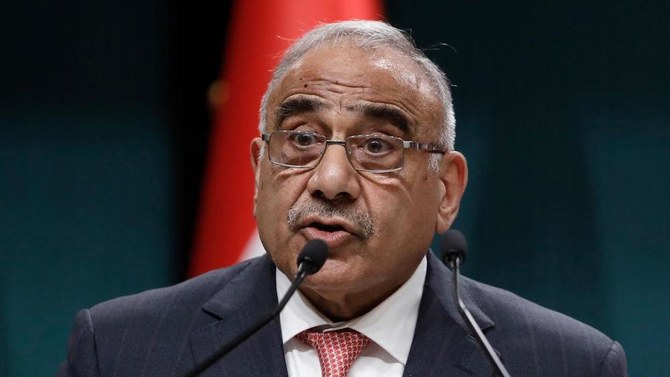BAGHDAD: Shiite cleric Moqtada Al-Sadr announced the dissolution of his armed wing Sarraya al-Salam on Monday and ordered the closure of its headquarters, uniting its fighters with the official security establishment.
Sarraya al-Salam was formed in June 2014 and consists of more than 20,000 fighters. It was set up to defend the Shiite shrines in northern Iraq when the radical Islamic militants, Daesh, stormed the northern and western parts of the country and sized most of Sunni-dominated towns and cities after the dramatic collapse of the Iraqi army. It is one of the largest armed Shiite factions that emerged from the mantle of Mehdi Army militia, which played a pivotal role during the sectarian war between Shiite and Sunni factions that slaughtered tens of thousands of innocent people from both communities across the country.
Sadr responded to a decree issued by Prime Minister Adel Abdul-Mahdi late on Monday to bring armed factions under the umbrella of the Popular Mobilization Units (PMU) less than an hour after it was circulated. This reflected Sadr’s great support for Abdul Mahdi’s government and aimed to embarrass the pro-Iranian armed factions, which would be seen to be undermining the state’s authority if they operate outside the official security establishment.
Opinion
This section contains relevant reference points, placed in (Opinion field)
Sarraya al-Salam, Asa’ib Ahl al-Haq and Kataib Huzbollah-Iraq, the most powerful Shiite militias that carried out deadly attacks against US troops in Iraq during the period of 2007–2011, in addition to Badr Organization, the oldest and most organized Shiite militia, represented the backbone of the PMU that fought Daesh alongside the government. The PMU are a government body established by Nuri al-Maliki, the former Iraqi Prime Minister in June 2014 to organize the work of the Shiite, Sunni, Yazidi and Christian armed factions and individuals that have volunteered for Daesh at that time. The PMU now consist of more than 150,000 fighters, whose equipment matches that of most of Iraq’s regular military units.
Abdul Mahdi’s decree seeks to bring the work of armed factions under the umbrella of the PMU and states that all factions are to operate under the commander of Abdul Mahdi, the commander-in-chief of the armed forces. They must give up their old names and replace them with official military names and classifications. No political affiliations are allowed. Any faction that refuses to give up its political affiliations must become a political organization. Factions that become political organizations, are only permitted to carry weapons for the purpose of protection. The decree also orders the closure of factional headquarters, the removal of checkpoints and the ending of activities outside the framework of the official military establishment.
“What was issued by the Prime Minister in terms of the PMU is an important decision and a correct step towards building a strong state,” Sadr said in a statement. “What I am interested in is that Sarraya al-Salam which I established, be the first to apply (the items of the decree) immediately.
“Abu Yasser (commander of Sarraya al-Salam) must immediately implement the orders by closing the headquarters, canceling the name of the faction and re-associate with the relevant government agencies.”




























